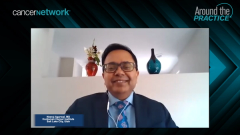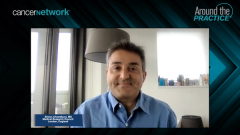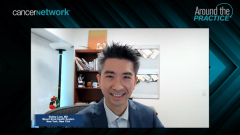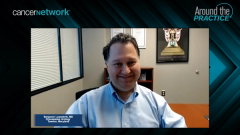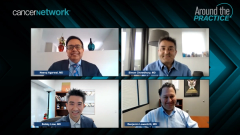
Selecting Between Doublet and Triplet Therapy in mCSPC
Expert panelists consider which factors would push them toward utilizing triplet therapy in patients with metastatic castration-sensitive prostate cancer.
Episodes in this series

Transcript:
Neeraj Agarwal, MD: Before we go to low volume, let me ask Ben this question about the choice of doublet vs triplet therapy in urology practice, especially given that no clinical trial has ever asked whether adding docetaxel to ADT [androgen deprivation therapy] plus abiraterone or ADT plus NHD backbone will improve survival. We saw that adding abiraterone or more recently darolutamide to the ADT plus docetaxel backbone improves survival. However, we do not have the question of whether adding docetaxel to ADT plus these androgen receptor targeted therapies would improve survival. That’s No. 1. In absence of those data, how do you choose between doublet and triplet therapy in your practice, in urology practice?
Benjamin Lowentritt, MD: I appreciate that. You stole my thunder there; I think the latest data said…only around 3% of patients were getting docetaxel for metastatic hormone sensitive disease. It’s hard to call that the standard of care, so you really would love to see what the result is if you add docetaxel to what is more the standard of care and has been for…several years. But we have the data, and…there has long been an attraction to intensifying therapy up front for these high-volume patients who can tolerate it. Even in the ARCHES and TITAN trials, you had patients who had received docetaxel and then were put on the oral therapy. It was usually low double digits to high single digits in those trials, but they did well, and they were prespecified analysis to look at those and they did equally well. I think there is data that suggest that patients don’t do worse when we combine them. Now we have evidence that says you do better than at least on docetaxel alone. Now, it’s about finding those patients whom my medical oncology colleagues will treat and, frankly, the ones who will tolerate it well. The chemotherapy fit patients with better performance status who are younger and willing to undergo a more intensified treatment up front and who have this high-volume disease because we are seeing this increased incidence of high-volume de novo disease likely linked to decreased screening in the United States in the last 5 to 10 years. Regardless, we were seeing that trend even before then that this disease seems to be getting a bit worse. I do think it’s going to be about finding those patients who fit the criteria and can go through both therapies together. We do not give cytotoxic chemotherapy in our practice; we give all the other types of therapies. It’s about having the patients having good discussion with us and then making sure they have access to the medical oncologist who can then have the same kind of discussion and go through more detail. That’s how I have approached it.
Neeraj Agarwal, MD: Thank you very much for sharing your experience on this one. I agree. In 2019 when less than 10% of patients were receiving docetaxel chemotherapy for…metastatic hormone-sensitive prostate cancer, it may be challenging for us to really enforce…triplet therapy in this patient population, which is often frail and elderly. I think it will be challenging at least for my practice to offer this to the majority of patients. Of course, there are some patients who are going to be straightforward eligible and are candidates for triplet therapy. Simon, I will come to you. In the absence of data comparing ADT plus enzalutamide or ADT plus apalutamide vs ADT plus enzalutamide or apalutamide plus docetaxel, I would like to add ADT plus abiraterone vs ADT abiraterone plus docetaxel. We cannot compare doublet vs triplet when we are adding docetaxel to the ADT plus NHD backbone. Which are the patients out there where you would use triplet therapy, especially if you may want to comment on genomic profiling of these patients? We really are hoping to get this perspective from you all because this is not going to be answered by a clinical trial anytime soon. How do you choose between doublet and triplet therapy? When I say doublet, I specifically mean ADT plus novel hormonal therapy vs triplet therapy.
Simon Chowdhury, MD: I usually ask you. I usually send the case to you and what do you think….I think there is a lot of confirmation bias when we chat with experts like the 3 of you because we use more chemotherapy than is routinely given. When we look at our own practices we are not using that much chemotherapy even before COVID[-19]. Chemotherapy patients tend to be younger, fitter, and they come back…every 3 weeks or so. They come back from complications, so we have this reinforcement….I think one of the patients I typically think of is younger, chemotherapy fit, as Ben said, and with high-volume, poor prognosis disease when you want to treat them as aggressively as possible, throw everything you can at them. You do see this on the baseline PSA [prostate-specific antigen] across the study, so PEACE-1 and ARASENS had high baseline PSA and that is after running period of up to 12 weeks on ADT, than we saw in ARCHES or TITAN. I do wonder whether there is something we can learn from PSA dynamics going on. This patient has got a very high PSA and I think is being very appropriately treated. Triplet is the right approach for this type of patient. Whether that’s better than ADT/docetaxel doublet, we don’t know. I think for me, there’s still a large part of the world, a lot of practices in the United Kingdom where patients get ADT alone. I think we need to get patients onto doublets, and the doublets for me, as Bobby eloquently said, the hazard ratio is better for the novel AR-targeted agents. For me, getting onto a doublet with enzalutamide/apalutamide or with abiraterone is key, and then using those drugs appropriately. As you said about the drug-drug interactions, making sure that those drugs are given. We manage those toxicities before we come in with chemotherapy. That’s how I see it. Let's get the doublets right first, and perhaps triplets in quite a selective group of patients who are younger and chemotherapy-fixed with high-volume disease.
Neeraj Agarwal, MD: Very nicely said. Thank you very much.
Transcript edited for clarity.
Newsletter
Stay up to date on recent advances in the multidisciplinary approach to cancer.


